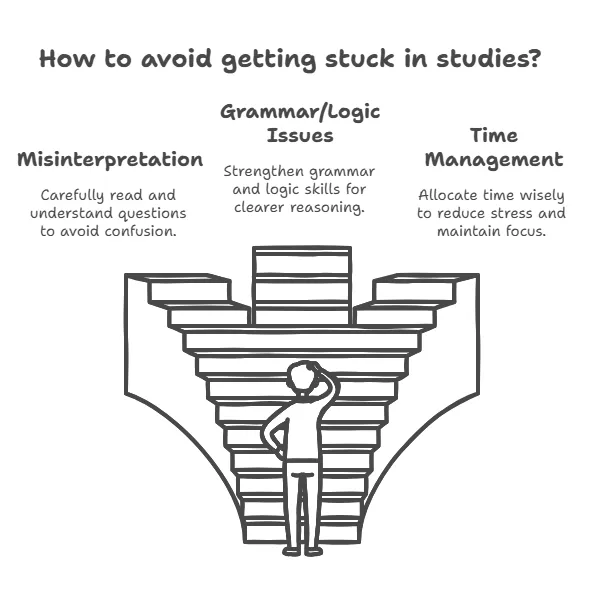What to Do If You Get Stuck on GMAT Verbal Questions
Preparing for the GMAT? The verbal section is no walk in the park, especially with its array of challenging question types—sentence correction, critical reasoning, and reading comprehension. It’s normal to hit a snag here and there, but don’t let these hurdles throw you off track. In this guide, we’ll discuss smart, actionable techniques to help you approach GMAT verbal questions with precision and confidence, unlocking your full potential.
What are the Types of GMAT Verbal Questions
GMAT verbal questions assess your ability to understand and analyze written material, as well as your ability to reason critically. The verbal section contains three main types of questions:
- Reading Comprehension:
- Tip: These questions require you to read a passage and answer related questions.
- Focus on identifying the main idea, tone, and structure of the passage.
- Take note of details and how they support the central argument.
- Read actively and highlight key points while practicing.
- Critical Reasoning:
- Tip: These questions test your ability to analyze arguments and evaluate conclusions.
- Identify assumptions, strengthen or weaken arguments, and look for logical flaws.
- Focus on understanding the reasoning behind each statement.
- Practice with diverse arguments to improve your critical thinking.
- Sentence Correction:
- Tip: Sentence correction questions ask you to identify errors in grammar, sentence structure, and clarity.
- Look for issues with subject-verb agreement, modifiers, and parallelism.
- Eliminate choices that don’t follow standard grammatical rules.
- Work on identifying patterns in the types of errors frequently tested.
| Section | Number of Questions | Time Limit | Question Types |
| Verbal Reasoning | 23 questions | 45 minutes | – Sentence Correction – Critical Reasoning – Reading Comprehension |
When you know the terrain, you’ll step into each question armed with the right tools.
Why Do Students Get Stuck?
Students often get stuck on GMAT verbal questions due to a variety of reasons. Understanding these challenges can help you navigate through difficulties more effectively. Consider the following factors:
- Lack of Understanding of the Passage:
- Reason: Some students may struggle with reading comprehension if they fail to fully understand the main idea or details of the passage.
- Solution: Focus on identifying the purpose and key points in the passage. Break down complex sentences and highlight key concepts as you read.
- Rushing Through the Questions:
- Reason: Time pressure can lead students to rush through questions, missing critical information.
- Solution: Practice pacing yourself and taking a few extra moments to thoroughly read each question before answering. Use the process of elimination when unsure.
- Overthinking the Answer Choices:
- Reason: Students may overanalyze the answer choices in sentence correction or critical reasoning questions, leading to confusion.
- Solution: Focus on the most straightforward, clear answer choice and avoid getting caught up in overly complex options.
- Difficulty with Complex Grammar Rules:
- Reason: Sentence correction questions often test complex grammar rules that some students find tricky.
- Solution: Review common grammar rules regularly and practice applying them to GMAT-style questions to build familiarity.
- Fatigue and Stress:
- Reason: Mental fatigue or stress can impair concentration and reasoning abilities, causing students to get stuck on questions.
- Solution: Take regular breaks during practice sessions to avoid burnout, and practice relaxation techniques to manage test anxiety.

Pinpoint your weak spots—self-awareness is the first step toward improvement.
Proven Tactics to Break Through Verbal Hurdles
When stuck, don’t panic. Use these techniques to regain control:
- Dissect the Question:
- Sentence Correction (SC): Read the full sentence; identify “splits” in answer choices to spot grammatical or stylistic flaws.
- Critical Reasoning (CR): Analyze the question stem first to understand what’s being asked. Look for keywords like “assumption” or “weaken.”
- Reading Comprehension (RC): Skim for main ideas and structure before diving into questions. Use keywords in the question to locate specific parts of the passage.
- Eliminate First, Choose Later:
Start by axing the obviously wrong options. This method narrows your choices and boosts your odds of selecting the correct answer. - Trust Simplicity:
Don’t overcomplicate. GMAT questions are designed to trick you with convoluted phrasing. Stick to the basics of grammar and logic.
Mastering Time Management
Time management is crucial when tackling GMAT verbal questions. Struggling to manage time effectively can lead to unnecessary stress and wasted effort. Here are some strategies to master time management during the exam:
- Set Time Limits Per Question:
- Tip: Allocate a specific amount of time to each question to prevent getting stuck on any single one. Aim for about 1.5 minutes per verbal question.
- Prioritize Easy Questions:
- Tip: Quickly skim through the questions and answer the ones you find easiest first. This builds confidence and ensures you complete as many questions as possible.
- Use the Process of Elimination:
- Tip: When stuck, eliminate obviously incorrect answer choices to narrow down your options. This can save time and improve your chances of selecting the right answer.
- Practice Pacing During Preparation:
- Tip: During practice tests, pay attention to your timing. Gradually reduce your time per question as you grow more comfortable with the material.
- Don’t Overthink:
- Tip: Avoid spending too much time overanalyzing any single question. If you’re unsure, make an educated guess and move on.
By managing your time effectively, you can reduce pressure and increase your chances of success on the GMAT verbal section.
Leveling Up Your Verbal Game
Consistency and quality are key. Make your prep count with these tips:
- Invest in Trusted Resources:
- The Official Guide for GMAT Review
- Manhattan Prep’s Sentence Correction Strategy Guide
- Learn From Mistakes:
Keep a log of errors. Analyze why you went wrong and adjust your approach accordingly. - Simulate Real Test Conditions:
Practice under timed, exam-like settings to build stamina and sharpen time management skills.
Must-Have Tools for GMAT Verbal Prep
Equip yourself with these top resources to enhance your preparation:
- Books:
- The Official Guide for GMAT Verbal Review
- PowerScore Critical Reasoning Bible
- Apps:
- GMAT Official Practice App
- Magoosh GMAT
- Online Platforms:
- GMAT Club (forums, question banks)
- Khan Academy (grammar and logic basics)
The Final Word
The GMAT verbal section can be daunting, but overcoming its challenges is entirely possible with the right approach. If you find yourself stuck, remember that staying composed and relying on your preparation is crucial. Every question is an opportunity to demonstrate your reasoning skills and verbal proficiency. Here are some final thoughts to guide you:
- Stay Positive: Confidence plays a key role in test performance. Even if a question seems tough, remind yourself of your preparation and move forward without dwelling.
- Use Elimination Tactics: Narrow down your options by eliminating clearly incorrect answers. This increases the probability of choosing the correct one, even if you’re unsure.
- Don’t Get Stuck: Time management is critical. If a question is taking too long, make an educated guess and move on. You can revisit it if time allows.
- Learn from Practice: Identify patterns in the questions you find challenging and focus your preparation on those areas.
- Leverage Strategies: Apply test-taking strategies such as skimming passages, understanding question types, and managing time effectively.
Ultimately, the GMAT is not just a test of knowledge but also of perseverance and strategy. By staying focused, managing time, and maintaining a positive mindset, you can tackle even the toughest verbal questions with confidence. Each question you conquer moves you closer to achieving your study goals.
FAQs
- What’s the fastest way to improve my GMAT verbal score?
Focus on weak areas first—grammar, reasoning, or reading speed. Consistent timed drills can improve both speed and accuracy. - How many questions in GMAT verbal section?
There are 23 questions in GMAT verbal section.
Your journey starts now. Commit to these strategies, and success will follow. Good luck!



